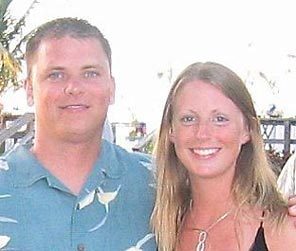Police here tried to track man before slayings

GRAHAM, Pierce County — Nearly a month before a convicted killer from Massachusetts was arrested in the Nov. 17 slaying of a Graham couple, Massachusetts police asked Washington state authorities to find him and monitor his activities.
Washington authorities were told they couldn't arrest Daniel Tavares Jr. because a warrant issued for him in a Massachusetts assault case did not call for his extradition.
The revelation that Tavares was on police radar a month before the slayings adds to the complexity of a case that's gained attention on both coasts and is even figuring into the race for the presidency.
In early October, Washington State Patrol Trooper George Mars went to Graham in his unmarked police car, where he sat and monitored a house and multiple trailers on property owned by Tavares' in-laws. Massachusetts State Police had asked Washington authorities — including the FBI — to determine if Tavares lived at the home and see if he was participating in any white-supremacist activities, said FBI spokeswoman Robbie Burroughs, in Seattle.
"They said, 'We think the guy is out there, and get a good address, but ... don't contact him, whatever you do,' " Burroughs said.
But after several days of monitoring the property, Mars reported that the 41-year-old was never seen, a Patrol spokeswoman said Monday.
Neighbors who spoke to Mars were never told why the trooper was watching the property, or that Tavares had been convicted and served time in Massachusetts for butchering his mother with a carving knife.
Pierce County Sheriff's Department spokesman Ed Troyer said his agency was never notified about Tavares. He said someone should have warned them that Tavares was living in Graham as a courtesy.
"The guys had a warrant for his arrest. He killed his mom, threatened politicians, threatened to kill his dad, threatened officers of the law, then comes out there. Absolutely, neighbors and others should have known," Troyer said. "It would have been a lot nicer if they would have contacted us. It's our jurisdiction."
Troyer concedes there is very little the department could have done if they knew about Tavares, other than having deputies who patrol the rural neighborhood familiarize themselves with him.
"We couldn't arrest him because the warrant was nonextraditable," Troyer said.
The case attracted national attention after it was revealed that a judge who allowed Tavares to remain free pending trial in an assault case had been appointed by GOP presidential candidate Mitt Romney when he was the governor of Massachusetts. Romney then called for the judge's resignation.
Days after Mars' unsuccessful surveillance, Tavares' name came up again during an FBI meeting in Washington, D.C., on presidential candidates' security, Burroughs said. While in prison, Tavares had threatened to kill Romney, and federal law enforcement had him on their radar as a security threat on the campaign trail.
Tavares was arrested Nov. 19 in the execution-style shootings of newlyweds Brian and Beverly Mauck.
Since moving to Graham last summer, Tavares had lived in a trailer feet from the Maucks' house.
On the morning of Nov. 17, Tavares went to the Maucks' home to collect $50 he believed Brian Mauck owed him for a tattoo he was putting on Mauck's back, according to relatives of the victims.
Mauck, 30, was supposed to pay Tavares $50 up front and $50 when he completed the inking, said Darrel Slater, Beverly Mauck's father.
Prosecutors allege that Tavares killed the couple over the $50 debt and because he had been insulted by Brian Mauck.
Pierce County prosecutors are considering whether to seek the death penalty against Tavares.
Tavares moved to Washington to marry a woman he met through a prison pen-pals program. According to Pierce County records, the couple were married July 30 — soon after he was released from prison.
Jennifer Tavares, 37, has been charged with one count of misdemeanor rendering criminal assistance. Prosecutors say she lied to authorities after the slayings in an attempt to protect her husband.
Tavares served 16 years behind bars in Massachusetts for stabbing his mother to death in 1991.
One employee of the Massachusetts Department of Corrections, who asked that his name not be used to protect his job, remembers Tavares as one of the worst inmates he has ever come into contact with.
"He was just a profane, obscene and foul man to deal with," the employee said Monday. "He was a guy difficult to deal with in a maximum-security setting. I could't imagine him drunk or high in a normal community setting."
The prison employee said Tavares spit on guards, hurled food trays and threw urine on other inmates. He said Tavares, who he labeled a racist, wrote letters threatening to kill Romney and a prosecutor. Tavares also threatened to kill the state prisons chief, as well as corrections staff, he said.
The prison employee said Tavares was punished inside prison for punching a guard and for spitting on another guard. Even though Tavares was a troublemaker, he received enough "good time" credits to be released from prison nearly two years early, the employee said.
Tavares completed his sentence in June, but before he was released, prosecutors in Massachusetts charged him with assaulting two guards and asked that he be kept in custody. A district-court judge ordered Tavares held on $50,000 bail on each count, but Tavares appealed the ruling.
On July 16, Superior Court Judge Kathe Tuttman ordered Tavares released on his own recognizance, rejecting arguments from a prosecutor that he posed a flight risk. Tuttman also rejected the prosecutor's request to place a tracking device on Tavares.
Tuttman ordered Tavares to live with his sister in Massachusetts and report by telephone three times a week to probation officials to confirm where he was living and any employment.
Tavares reported to probation officials July 18, but failed to appear for a court hearing July 23, prompting a warrant to be issued for his arrest. But the warrant did not include an extradition request from a state as far as away as Washington because of the cost.
On Saturday, Romney called for Tuttman to resign.
Republican presidential candidate Rudy Giuliani has cited the case to criticize Romney's record on crime. But others have come to the judge's defense, including the chief justice of the Massachusetts Superior Court.
Chief Justice Barbara Rouse said Monday that Tuttman applied the law to the facts that were before her when she made the decision to free Tavares.
"Today, unfortunately, she is living every judge's nightmare: that a principled decision based on the law and the information provided to her was followed by tragic events over which she had no control," Rouse said in a statement.
While Romney was in Seattle Nov. 19, Massachusetts police contacted his campaign to report that Tavares might be living in Washington state, a Romney spokesman said.
Information from The Associated Press is included in this report.
Jennifer Sullivan: 206-464-8294
Steve Miletich: 206-464-3302

